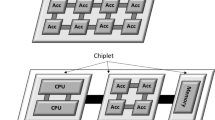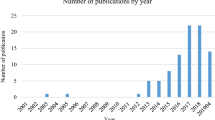Abstract
Temperature affects not only the performance but also the power, reliability, and cost of the embedded system. This paper proposes a temperature-aware task allocation and scheduling algorithm for MPSoC embedded systems. Thermal-aware heuristics are developed, and a temperature-aware floorplanning tool is used to reduce the peak temperature and achieve a thermally even distribution while meeting real time constraints. The paper investigates both power-aware and thermal-aware approaches to the task allocation and scheduling. The experimental results show that the thermal-aware approach outperforms the power-aware schemes in terms of maximal and average temperature reductions. To the best of our knowledge, this is the first MPSoC task allocation and scheduling algorithm that takes temperature into consideration.
Similar content being viewed by others
References
C. Tsai and S. Kang, “Cell-Level Placement for Improving Substrate Thermal Distribution,” IEEE Trans. Comput.-Aided Des., vol. 19, no. 2, 2000, pp. 253–266, Feb.
J. Srinivasan, S. V. Adve, P. Bose, and J. Rivers, “The Impact of Technology Scaling on Lifetime Reliability,” in Proc. of International Conference on Dependable Systems and Networks, June 2004.
Y. Xie and W. Wolf, “Allocation and Scheduling of Conditional Task Graph in Hardware/Software Co-Synthesis,” in Proc. of Design, Automation and Test in Europe Conference, 2001, pp. 620–625.
A. Doboli, “Integrated Hardware-Software Co-Synthesis and High-Level Synthesis for Design of Embedded Systems under Power and Latency Constraints,” in Proc. of Design, Automation and Test in Europe Conference, 2001.
J. Liu, P. Chou, N. Bagherzadeh, and F. Kurdahi, “Power-Aware Scheduling under Timing Constraints for Mission-Critical Embedded Systems,” in Proc. of the 38th Conference on Design Automation, Las Vegas, Nevada, 2001, 840–845.
L. Shang and N. K. Jha, “Hardware-Software Co-Synthesis of Low Power Real-Time Distributed Embedded Systems with Dynamically Reconfigurable FPGAs,” in Proc. of the 2002 Conference on Asia South Pacific Design Automation/VLSI Design, January 2002.
Y. Zhang, X. Hu, and D. Z. Chen, “Low-Power System Design: Task Scheduling and Voltage Selection for Energy Minimization,” in Proc. of the 39th Conference on Design Automation, June 2002.
D. Shin and J. Kim, “System Level Issues: Power-Aware Scheduling of Conditional Task Graphs in Real-Time Multiprocessor Systems,” in Proc. of the 2003 International Symposium on Low Power Electronics and Design, August 2003.
M. Schmitz, B. Al-Hashimi, and P. Eles, “Energy-Efficient Mapping and Scheduling for DVS Enabled Distributed Embedded Systems,” in Proc. of the Conference on Design, Automation and Test in Europe, 2002, p. 514.
K. Skadron, M. R. Stan, W. Huang, S. Velusamy, K. Sankaranarayanan, and D. Tarjan, “Temperature-Aware Microachitecture,” in Proc. of the 30th International Symposium on Computer Architecture, pp. 2–13, June 2003.
W. Wolf and J. Staunstrup, “Hardware/Software co-design Principles and Practice,” Kluwer, 1997.
Microprocessor, vol. 18, Archive 5, May 2004.
J. Luo and N. K. Jha, “Power-conscious Joint Scheduling of Periodic Task Graphs and Aperiodic Tasks in Distributed Real-time Embedded Systems,” Proc. of the 2000 IEEE/ACM International Conference on Computer-Aided Design, November 2000.
R. P. Dick, D. L. Rhodes, and W. Wolf, “TGFF: Task Graphs For Free,” in Proc. of the 6th International Workshop on Hardware/Software Codesign, 1998.
D. Brooks and M. Martonosi, “Dynamic Thermal Management for High-Performance Microprocessors,” in Proc. of the Seventh International Symposium on High-Performance Computer Architecture, 2001, pp. 171–182.
W-L. Hung, Y. Xie, N. Vijaykrishnan, C. Addo-Quaye, T. Theocharides, and M. J. Irwin, “Thermal-Aware Floorplanning Using Genetic Algorithms,” in International Symposium on Quality Electronic Design (ISQED), 2005.
W. Wolf, “The future of Multiprocessor Systems-on-Chips,” in Proc. of Design Automation Conference, 2004, pp. 681–685
W. Hung et al., “Thermal-Aware IP Virtualization and Placement for Networks-on-Chip Architecture,” in Proc. of IEEE 22nd International Conference on Computer Design, 2004.
K. Ramamritham, “Allocation and Scheduling of Precedence-Related Periodic Tasks,” IEEE Trans. Parallel Distrib. Syst., vol. 6, no. 4, 1995, pp. 412–420, April.
Embedded System Synthesis Benchmarks Suite (E3S) http://www.ece.northwestern.edu/~dickrp/e3s/.
S. Dutta, R. Jensen, and A. Rieckmann, “Viper: A Multiprocessor SOC for Advanced Set-Top Box and Digital TV Systems,” IEEE Des. Test Comput., 2001, pp. 21–31, Sep/Oct.
http://www-03.ibm.com/chips/products/asics/products/soc.html
Y. Xie and W. Wolf, “Co-Synthesis with Custom ASICs,” in Proc. of the Asia and South Pacific Design Automation Conference (ASP-DAC), pp. 129–134.
Author information
Authors and Affiliations
Rights and permissions
About this article
Cite this article
Xie, Y., Hung, Wl. Temperature-Aware Task Allocation and Scheduling for Embedded Multiprocessor Systems-on-Chip (MPSoC) Design. J VLSI Sign Process Syst Sign Image Video Technol 45, 177–189 (2006). https://doi.org/10.1007/s11265-006-9760-y
Received:
Revised:
Accepted:
Published:
Issue Date:
DOI: https://doi.org/10.1007/s11265-006-9760-y




